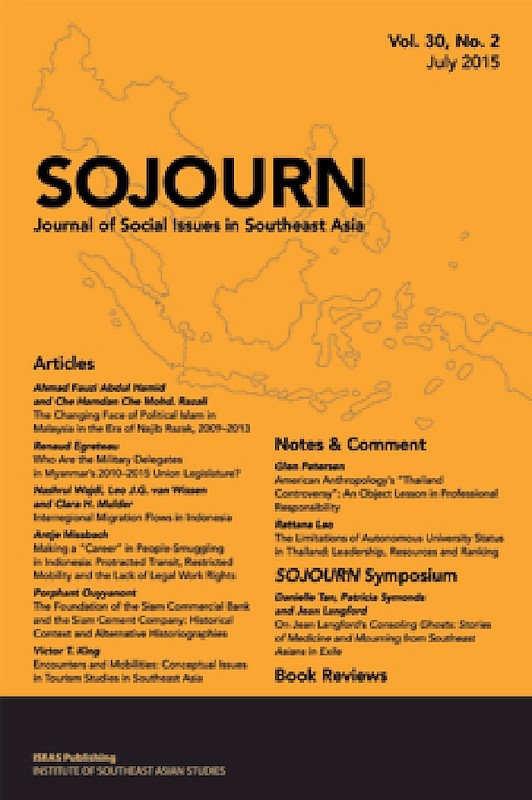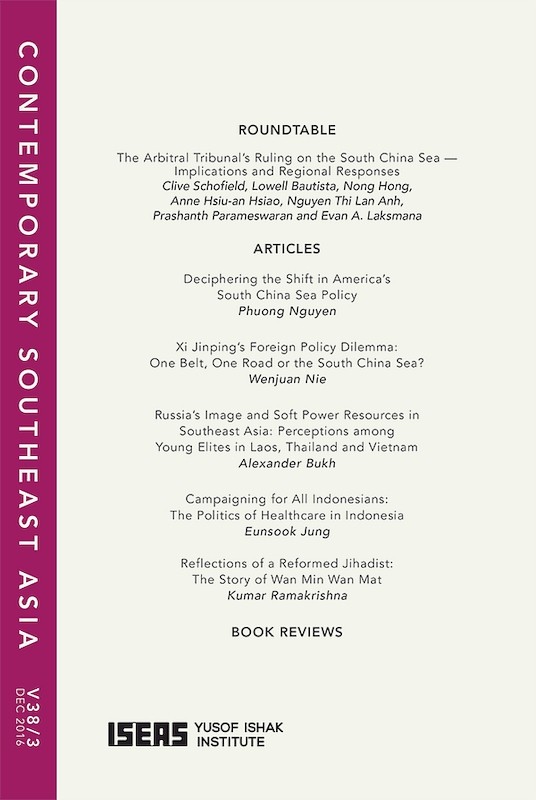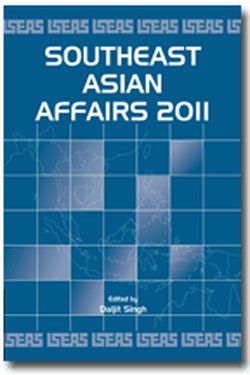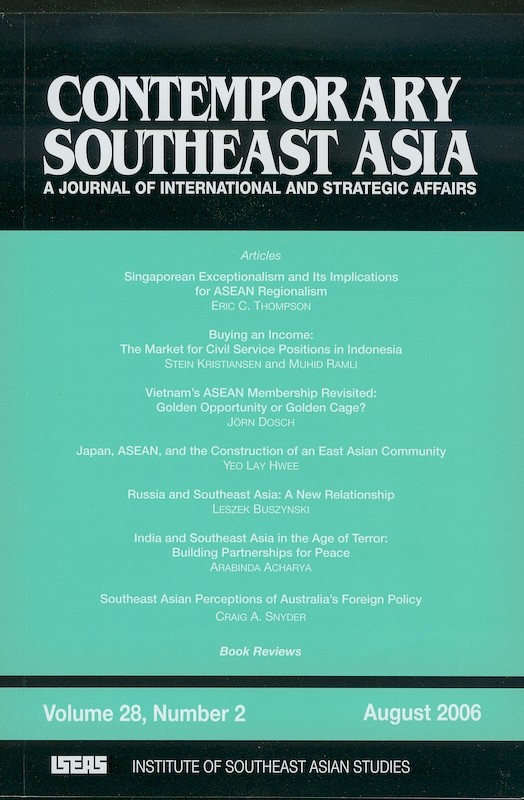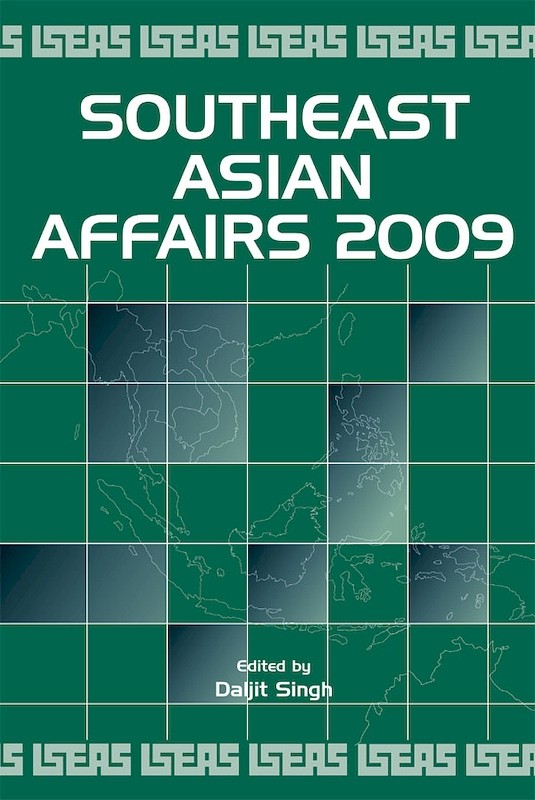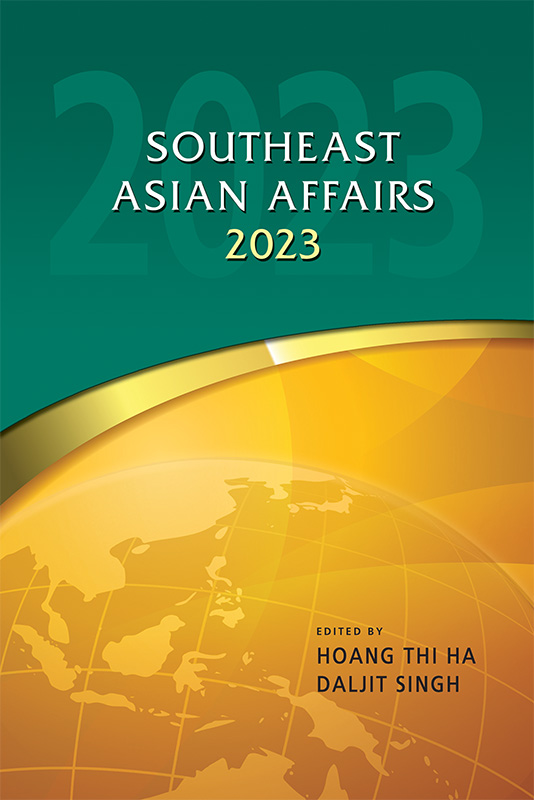Singapore Lectures 1980-2018: A Selection
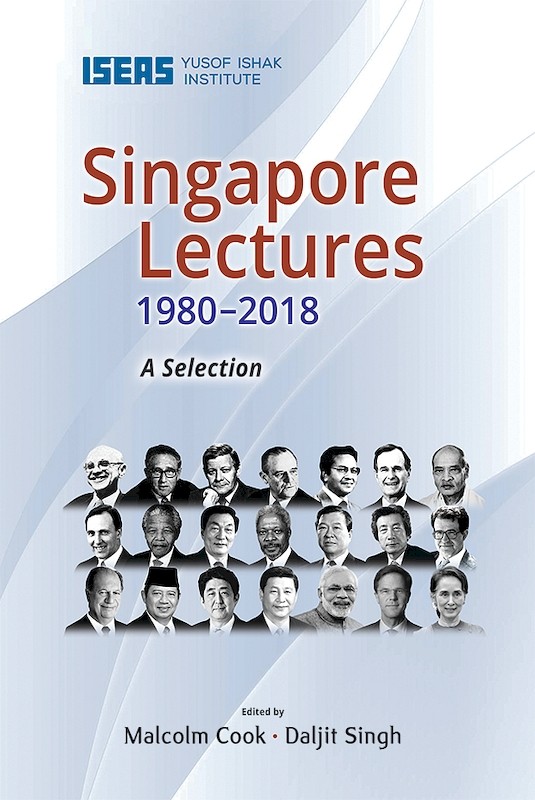
Date of publication:
2020
Publisher:
ISEAS – Yusof Ishak Institute
Number of pages:
315
Code:
PIC279
Hard Cover
ISBN: 9789814881913
About the publication
Over the last 40 years, the ISEAS – Yusof Ishak Institute has been honoured to partner with the Singapore government in hosting 44 Singapore Lectures. The Singapore Lecture series is a unique public platform for world leaders and experts visiting Singapore that reflects the city-state’s role as a global hub of ideas and diplomacy. The 21 lectures chosen for this 40th anniversary volume chart the fundamental changes in the global economy and the inter-state system that Southeast Asia and Singapore have successfully navigated over these four momentous decades.
"The Singapore Lectures reflect the city-state’s progress for the past forty years. This selection skilfully captures the highlights from the way Singapore began to learn to read the world to how it became an open and inclusive site of globalization.
The collection might do more. The leaders from the five continents who spoke at ISEAS had come to share their experiences, their wisdom and, not least, their dreams. Following what they offered gives us a multifaceted picture that is instructive. It gives readers the chance to review an era of intense rivalry during which political conflicts were accompanied by unprecedented economic growth, when lessons were learnt from tragic failures and leaping successes.
Read together, the lectures give us hope in a time of unprecedented global turmoil: there will surely be future leaders who could find ways to rid the world of its demons."
--Wang Gungwu, Professor, National University of Singapore (NUS), and former Chairman of the ISEAS – Yusof Ishak Institute Board of Trustees
Contents
-
Singapore Lectures 1980-2018: A Selection
[Whole Publication, ISBN: 9789814881920], by Malcolm Cook, Daljit Singh, editors -
Preliminary pages with Introduction
-
1. The Invisible Hand in Economics and Politics, by Milton Friedman , author see abstractMilton Friedman, Nobel laureate in economics and Professor of Economics at the University of Chicago, delivered the inaugural Singapore Lecture on 14 October 1980. He was introduced to the audience by Singapore Deputy Prime Minister Dr Goh Keng Swee. A proponent of free market capitalism with minimal governmental involvement, Professor Friedman’s influential ideas helped to move economic consensus to the right, leading to the free market revolutions in Britain and America in the 1980s. They also had strong influence in other parts of the world. Professor Friedman’s lecture, followed by a Q&A session, was a stimulating exposition of his ideas.
-
2. American Foreign Policy: A Global View, by Henry Kissinger, author see abstractOn 30 October 1981, Dr Henry Kissinger, the former US Secretary of State, gave the 2nd Singapore Lecture after being welcomed by Singapore’s Deputy Prime Minister S. Rajaratnam. Dr Kissinger was the second American and first former government official to give a Singapore Lecture following Professor Milton Friedman in 1980. His lecture analyses the unique position of the US globally in the post-World War II era and the challenges this poses for US foreign policy. This is followed by his observations on communism and the Soviet Union and US relations with the developing world, including a critique of the non-aligned movement’s criticisms of the US. The lecture serves an excellent primer for the domestic and global dimensions of US post-war foreign and security policy.
-
3. The Soviet Union: Challenges and Responses as Seen from the European Point of View, by Helmut Schmidt, author see abstractOn 10 November 1983, the former Chancellor of the Federal Republic of Germany Helmut Schmidt gave the 4th Singapore Lecture after being welcomed by Minister for Culture S. Dhanabalan. Mr Schmidt was the first German and second European former political leader to give a Singapore lecture. Former President of France Valéry Giscard d’Estaing gave the 3rd Singapore Lecture in 1982. Mr Schmidt’s lecture is a very erudite speech setting out the challenge of the Soviet Union to Western Europe and the wider world. Six years before the fall of the Berlin Wall, it serves as an eloquent reminder of the nature of the global Cold War system.
-
4. Trends in the International Financial System, by Raymond Barre, author see abstractOn 25 November 1986, economist and former Prime Minister of France Raymond Barre gave the 7th Singapore Lecture after being welcomed by Senior Minister S. Rajaratnam. Professor Barre was the third of three eminent economists to give a Singapore Lecture, starting with Professor Milton Friedman in 1980. Professor Barre’s lecture is a very lucid analysis of the systemic risks inherent to the post-Bretton Woods international financial system. A decade prior to the cataclysmic Asian Financial Crisis centred in Southeast Asia, it serves as a timely reminder of the power and economic and political risks of global financial flows.
-
5. Regionalism, Globalism and Spheres of Influence: ASEAN and the Challenge of Change into the 21st Century, by Mahathir Mohamad, author see abstractOn 14 December 1988, Prime Minister of Malaysia Mahathir Bin Mohamad gave the 9th Singapore Lecture after being welcomed by Singapore’s first foreign minister S. Rajaratnam. Prime Minister Mahathir was the first Asian leader to give a Singapore Lecture and the second sitting political leader to give a Singapore Lecture following Prime Minister Bob Hawke of Australia in 1987. Prime Minister Mahathir’s lecture stands out for its broad and ambitious vision. The lecture weaves together the emergence of a pragmatic post-Cold War global era, the rise of China and the need for closer ASEAN integration and cooperation in this emerging global order. The lecture serves as a useful source of reflection for current analysis of these very same issues.
-
6. US Policy in the Asia-Pacific Region: Meeting the Challenges of the Post-Cold War Era, by George HW Bush, author see abstractOn 4 January 1992, President of the United States of America George H.W. Bush gave the 12th Singapore Lecture after being welcomed by Senior Minister Lee Kuan Yew. President Bush was the first and still the only US President to give a Singapore Lecture. His lecture focuses on the profound global strategic changes ushered in by the end of the Cold War, and for US engagement in East Asia and with ASEAN. In the current period of doubt over the US interests and influence in East Asia, this lecture serves as a useful, recent counterpoint.
-
7. India and the Asia-Pacific: Forging a New Relationship, by PV Narasimha Rao, author see abstractOn 8 September 1994, Prime Minister of India P.V. Narasimha Rao gave the 13th Singapore Lecture after being welcomed by Senior Minister Lee Kuan Yew. Prime Minister Rao was the first Indian leader and second political leader from Asia to give a Singapore Lecture. The lecture focuses on India’s historic and contemporary ties to East Asia and the importance of ASEAN to India. The lecture serves as a good foreshadowing of India’s growing relationship with ASEAN as shown by India becoming a full ASEAN dialogue partner a year later and a founding member of the East Asia Summit in 2005.
-
8. Australia, Asia and the New Regionalism, by Paul Keating, author see abstractOn 17 January 1996, Prime Minister of Australia Paul Keating gave the 14th Singapore Lecture after being welcomed by Singapore’s Deputy Prime Minister Tony Tan who referred to Mr Keating as “Australia’s most Asia-oriented Prime Minister”. Prime Minister Keating was the second of four Australian leaders to give a Singapore Lecture following Prime Minister Bob Hawke in 1987. His lecture is a clear exposition of why Australia has turned its focus to Asia. It also reflects the optimism at the time about regionalism, with Keating regarding APEC as the “new model for regional cooperation” particularly suited for the post-Cold War era.
-
9. South and Southern Africa into the Next Century, by Nelson R Mandela, author see abstractNelson R. Mandela, the President of the Republic of South Africa, delivered the 16th Singapore Lecture on 6 March 1997. He was introduced to the audience by Singapore’s Deputy Prime Minister and Defence Minister Dr Tony Tan. President Mandela was the first of two African leaders to give a Singapore Lecture, followed in 2005 by his successor President Thabo M. Mbeki. President Mandela speaks of his vision for South and Southern Africa and the need to re-establish and strengthen the historical ties between Africa and Asia.
-
10. China and Asia in the New Century, by Zhu Rongji, author see abstractOn 30 November 1999, Premier of the State Council of the People’s Republic of China Zhu Rongji gave the 17th Singapore Lecture after being welcomed by Deputy Prime Minister Lee Hsien Loong. Premier Zhu was the first Chinese political leader and second leader from Northeast Asia to give a Singapore Lecture. Befitting China’s size and Premier Zhu’s responsibilities, his speech focuses on changes to the Chinese economy and the benefits for Asia and the world of Chinese economic development and growth. The lecture serves as an early statement on China’s emerging central economic role in Asia and globally.
-
11. Global Values: The United Nations and the Rule of Law in the 21st Century, by Kofi Annan, author see abstractKofi A. Annan, Secretary-General of the United Nations, delivered the 18th Singapore Lecture on 14 February 2000. He was introduced by Minister for Foreign Affairs and Law Professor S. Jayakumar. The lecture is an eloquent defence of the importance of international law and the need for all countries to uphold the rule of law. These issues have assumed greater salience in present times when international rules and norms are being challenged by powerful states.
-
12. Peace on the Korean Peninsula and East Asia, by Kim Dae-jung, author see abstractPresident Kim Dae-jung of the Republic of Korea gave the 19th Singapore Lecture on 27 November 2000. He was introduced by Deputy Prime Minister Lee Hsien Loong. President Kim was awarded the 2000 Noble Peace Prize for his efforts to improve the lives of the Korean people at great personal cost, and to reach out to North Korea through his “Sunshine Policy” which resulted in the historic first summit meeting between leaders of the two Koreas in Pyongyang. The lecture focuses on inter-Korean relations and their importance to East Asia.
-
13. Japan and ASEAN in East Asia: A Sincere and Open Partnership, by Junichiro Koizumi, author see abstractOn 14 January 2002, Prime Minister of Japan Junichiro Koizumi gave the 20th Singapore Lecture after being welcomed by Deputy Prime Minister Tony Tan. Prime Minister Koizumi was the second Japanese prime minister to give a Singapore lecture following Prime Minister Ryutaro Hashimoto who gave the 15th Singapore Lecture in 1997. Prime Minister Koizumi’s lecture stands out for three reasons: his focus on Japan’s relations with ASEAN, a clear set of policy recommendations for future Japan-ASEAN cooperation, and his argument that the Japan-ASEAN relationship should be the platform for a wider East Asian community. This speech is a clear enunciation of the idea of ASEAN centrality in East Asia.
-
14. EU and Asia: Sharing Diversity in an Inter-regional Partnership, by Romano Prodi, author see abstractMr Romano Prodi, President of the European Commission and former Prime Minister of Italy, gave the 22nd Singapore Lecture on 6 July 2002. He was introduced to the audience by Deputy Prime Minister Lee Hsien Loong. Prodi is optimistic about the EU’s ability to deal successfully with the complex challenges that its planned expansion from 15 to 25 or 28 members would pose. It is a worthwhile point of reflection for both for the EU and for ASEAN which itself expanded from 6 to 10 members in the 1990s.
-
15. Global Challenges in the 21st Century: A View from Chile, by Ricardo Lagos, author see abstractPresident Ricardo Lagos of Chile gave the 24th Singapore Lecture on 30 April 2004 during his state visit to Singapore. He has been the only Latin American leader to do so. He was introduced to the audience by Deputy Prime Minister Lee Hsien Loong. While sharing Singapore’s outlook on good governance and free trade, President Lagos expresses concern about the downside of globalization on the weaker sectors of society and the environment, something that was to attract more international attention in the second decade of the new century. He advocates for new international institutions and rules to ensure that globalization is fair to everybody.
-
16. Indonesia: The Challenge of Change, by Susilo Bambang Yudhoyono, author see abstractPresident Susilo Bambang Yudhoyono of the Republic of Indonesia gave the 25th Singapore Lecture on 16 February 2005, less than four months into his presidency and less than two months after the devastating Boxing Day tsunami that hit Sumatra. He was introduced by Senior Minister Mr Goh Chok Tong. Yudhoyono was an active foreign policy president and a strong supporter of ASEAN. His lecture focuses on Indonesia’s domestic challenges and Indonesia- Singapore relations.
-
17. Japan and ASEAN, Always in Tandem: Towards a More Advantageous Win-Win Relationship through My “Three Arrows”, by Shinzo Abe, author see abstractPrime Minister Shinzo Abe of Japan delivered the 33rd Singapore Lecture on 26 July 2013. He was the third Japanese Prime Minister to do so. His visit to Singapore was his third to Southeast Asia within the seven months since he took office in December 2012, clearly indicating the importance he accorded to the region. He was introduced by Singapore Deputy Prime Minister and Minister for Finance Tharman Shanmugaratnam. The lecture focuses on the Prime Minister’s vision of building a new Japan through his reforms and on Japan-ASEAN relations.
-
18. Forging a Strong Partnership to Enhance Prosperity of Asia, by Xi Jinping, author see abstractPresident Xi Jinping of the People’s Republic of China delivered the 36th Singapore Lecture on 7 November 2015, during his first state visit to Singapore. The occasion also marked the 25th anniversary of the establishment of diplomatic relations between Singapore and China. President Xi was introduced by Singapore’s Deputy Prime Minister and Coordinating Minister for National Security Mr Teo Chee Hean. President Xi spoke as the confident leader of a country whose astonishing development had catapulted it to the second-largest economy in the world and with greatly expanded influence.
-
19. India’s Singapore Story, by Narendra Modi, author see abstractPrime Minister Narendra Modi of India delivered the 37th Singapore Lecture on 23 November 2015. He was introduced by Singapore Deputy Prime Minister and Coordinating Minister for Economic and Social Policies Tharman Shanmugaratnam. Prime Minister Modi was the third Indian Prime Minister to give a Singapore Lecture. Elected as leader of India only a year and a half earlier, he was riding a wave of optimism about his bold domestic and foreign policy initiatives. The lecture covers a range of subjects from India-Singapore relations to India’s domestic transformation and to India in East and Southeast Asia.
-
20. The Netherlands, Singapore, Our Regions, Our World: Connecting Our Common Future, by Mark Rutte, author see abstractPrime Minister Mark Rutte of the Netherlands delivered the 39th Singapore Lecture on 24 November 2016. He was introduced by Deputy Prime Minister and Coordinating Minister for Economic and Social Policies Tharman Shanmugaratnam. He was the third Netherlands Prime Minister to give a Singapore Lecture. His lecture is a robust defence of openness and free trade, especially for small countries like the Netherlands and Singapore, at a time when the forces of nationalism and populism were gaining ground in Europe and the United States of America.
-
21. Democratic Transition in Myanmar: Challenges and the Way Forward, by Aung San Suu Kyi, author see abstractThe 43rd Singapore Lecture was delivered on 21 August 2018 by State Counsellor of the Republic of the Union of Myanmar Daw Aung San Suu Kyi. She was introduced by Deputy Prime Minister and Coordinating Minister for National Security Teo Chee Hean. In her lecture Daw Suu, a Nobel Peace Prize laureate, outlines eloquently how Myanmar is dealing with the formidable challenges of national unity, economic development and security, including the problems in Rakhine state. She also spoke about her emphasis on improving education, infrastructure and governance.
-
The Singapore Lecture Series
-
The Editors

